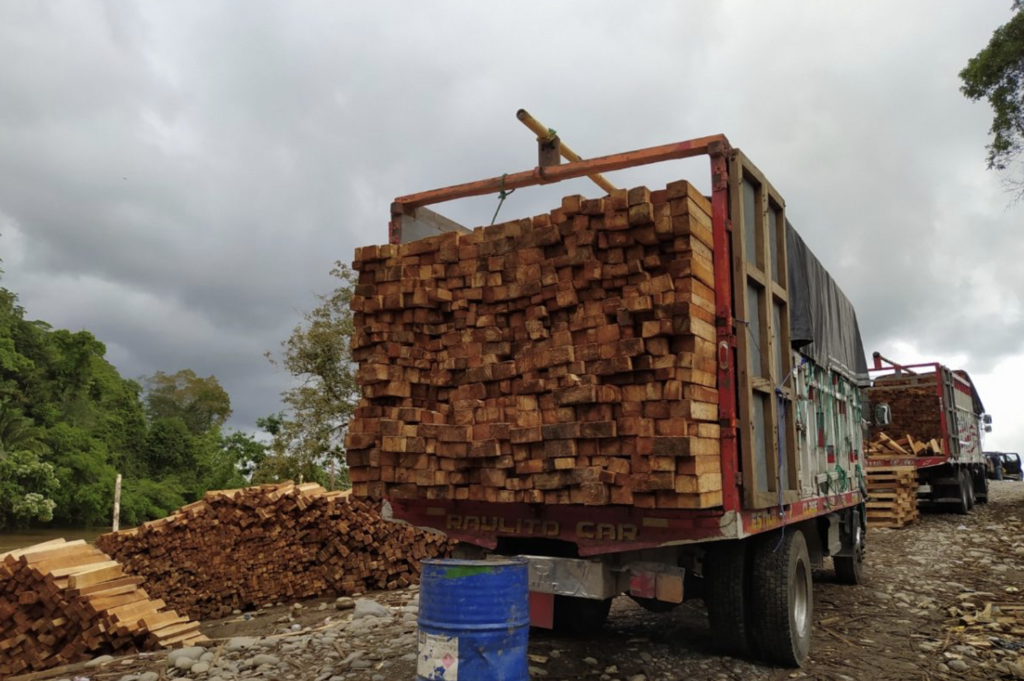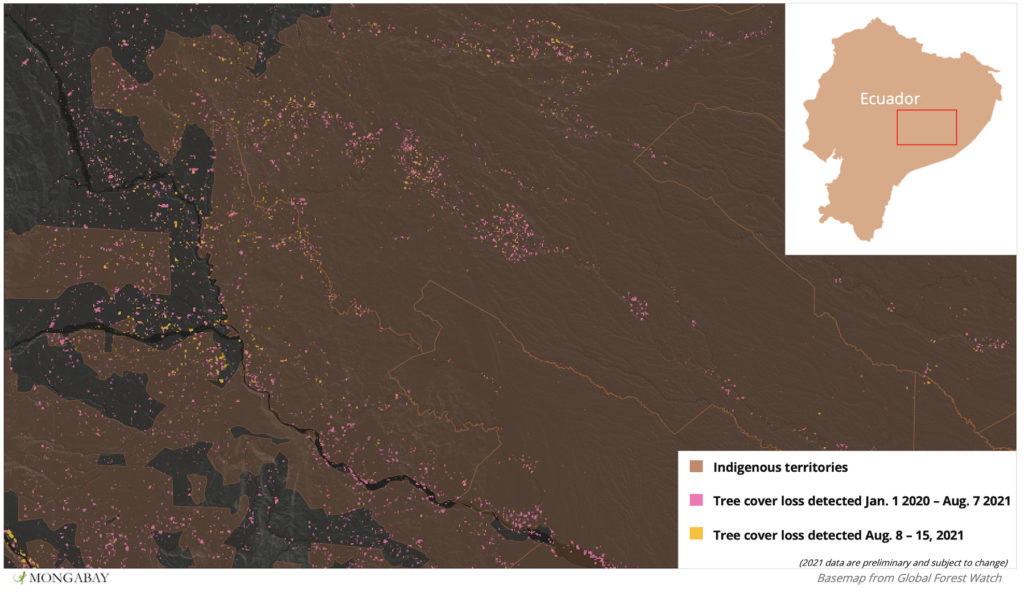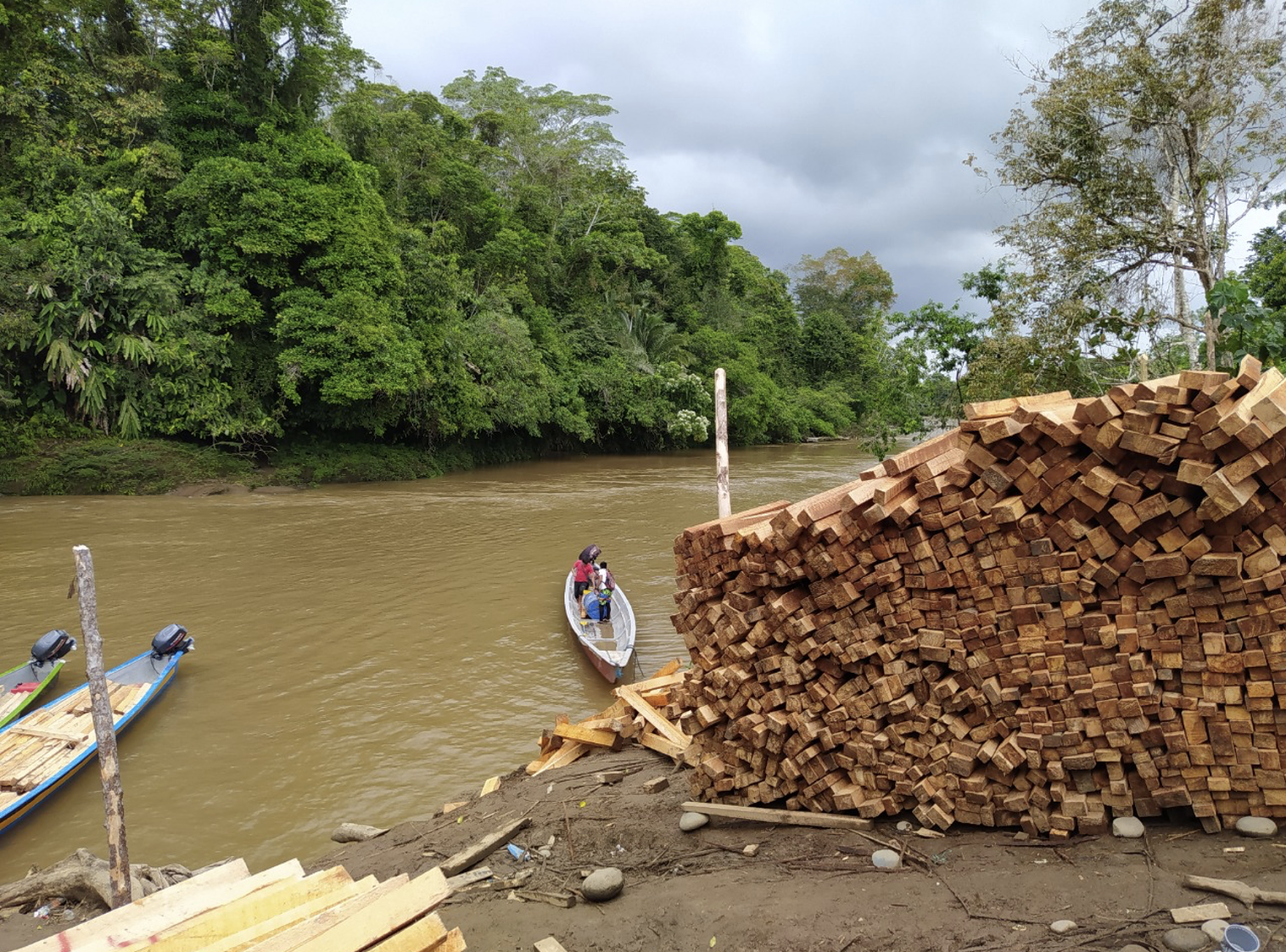Ecuador is the world’s biggest exporter of balsa wood, most of it shipped to China. Indigenous communities in Ecuador’s Pastaza River Basin say balsa is being logged illegally in their territories and is damaging the ecological integrity of the region and hurting Indigenous communities. The problem has reportedly spread to neighboring Peru, where Indigenous communities accuse Ecuadoran balsa loggers of felling commercially valuable trees and even kidnapping a child.
Balsa wood is a hot commodity in Ecuador, with the country exporting $402 million worth of the timber in 2020 alone, according to data from the central bank. But the lucrative trade has reportedly come at a cost to communities living in the country’s Amazon region, who allege they have suffered from the impacts the industry is having on the land where balsa trees are harvested.
Wood from the balsa tree (Ochroma pyramidale) is soft and lightweight, and is used to make goods like rafts, surfboards and musical instruments, as well as packing materials.
Ecuador established itself as the top balsa exporter in 2015. By 2017, the country had doubled the value of its annual exports to $150 million. China is the biggest market for Amazonian balsa, accounting for 85% of the 77,140 tons Ecuador exported in 2020. In the first quarter of 2021, Ecuador exported $28.7 million worth of balsa, $18.4 million of which went to China.
The Pastaza River Basin is one of the areas most affected by the balsa industry. There, the Pastaza, Bobonaza, Curaray, Villano, Copataza and other rivers are used as logging access routes, with satellite imagery showing their banks increasingly pockmarked by deforestation. Locals say that the logging has been so intense that balsa has been completely removed from some areas.
Patricia Gualinga, a Kichwa Indigenous leader from the Sarayaku community, said she has seen dozens of trucks loaded with wood plying the roads in her territory. She recalled seeing logged clearings proliferating along the edges of roads.
Narcisa Mashienta is involved with maternal and child health programs in the Achuar territory that straddles the provinces of Morona Santiago and Pastaza. She said balsa logging activity in the Shuar and Achuar territories was “like a machine, exploiting so fast.”
Illegal logging leading to crime
Belén Páez, the Director of Fundación Pachamama, which advocates for Indigenous and environmental rights, is working with other researchers on a balsa management plan to address the impacts the trade is having on the Ecuadoran Amazon. She said loggers are starting to harvest other timber species in areas that have been denuded of balsa.
“The same loggers and traders that one year ago arrived from [the cities of] Quevedo, Esmeraldas or Guayaquil are now arriving to look at what else is there,” Páez said.
“There is an ongoing process of deforestation of valuable tree species in Indigenous territories” with no monitoring by the authorities, she added.
Mashienta expressed concern that the balsa industry may be leading to increased drug use in Indigenous communities. She alleged that after logging commercially valuable tree species, the loggers plant illegal crops like coca and marijuana.
Allegations have also surfaced connecting the industry to human trafficking. On May 4th of this year, a 6-year-old girl, Rubí Pujupat Achampash, disappeared from her community in the Wampis Indigenous Territory in neighboring Peru. The Wampis Nation’s communication team wrote in a report that “the only option is that it was balsa loggers because it happened at a time when balsa loggers invaded from Ecuador.” At the time this story was published, the child was still missing.
On June 5th, a group of Wampis people traveled to Tiwintza, just across the border in Ecuador, to meet with local authorities. Josefina Tunki, the President of the Shuar Arutam community, announced a joint communal effort to oversee the legal process and search for Rubí.
Atilio Noningo, technical undersecretary with the Wampis Nation’s government, reported that Ecuadorans had entered their territory illegally, and demanded the government of Ecuador take responsibility for Rubí’s search.
“There is no territorial control by [our] Ecuadoran neighbors, there are many intrusions to extract the natural resources that are in the Wampis Nation territories,” Noningo said. He added that binational “articulated work” is needed to stop the illegal extraction of resources.
During that same meeting, José Petsain Sunk, a leader of the Wampis Nation in the autonomous government of the Cuenca-Kanús-Río Santiago, also warned about loggers arriving from Ecuador, saying “they are also extracting other wood secretly.”
Narcisa Mashienta said that when the balsa boom began, residents thought it could be a way to help them make a living.
“Families saw that it was much easier to extract balsa than [other types of] wood because they were on the riverbank and it was easier to sell them,” Mashienta said.
But Patricia Gualinga said locals who logged and sold their balsa trees ended up with a meager income.
“They are the last link in the middlemen chain,” she said.
Sustainable harvesting must be part of the future
Domingo Peas, the leader of the Achuar Nation of Ecuador and adviser of the initiative ‘Sacred Headwaters: Territories of Life,’ said the balsa logging industry “has broken the organizational structural order” of Ecuador’s Amazonian communities. Peas’s own native community of Sharamentza and communities in the surrounding Sapara territory have imposed a ban on balsa harvesting. Other territories, such as those of the Achuar, are trying to blend sustainable harvesting with habitat conservation.
Peas said he is in talks with the Swiss company Plantabal to design a program that would train communities to harvest balsa without damaging the surrounding environment. Manari Ushigua, former President of the Sapara Nation, is leading an initiative to produce online lectures that explain the symbolic importance of the forest and how it contributes to Sapara religious beliefs and practices.
“All kinds of birds use balsa to balance their energy, monkeys use it, tapirs, peccaries, also nocturnal animals like the jaguar and the agouti,” Ushigua said. “But on top of that, at night there are spiritual beings from the mountains that come to the balsa to balance their energy.”
Rodrigo Sierra is a scientist working with the Achuar Nation to find ways to resist and adapt to balsa exploitation. He said logging is facilitated by a “lack of effective control” by the government due to the remoteness of the regions where balsa is harvested.
“Balsa goes out without a harvesting permit,” Sierra said.
Álvaro Pérez, a biologist and lecturer at Pontificia Universidad Católica del Ecuador, said what the government is doing on paper is different than what’s happening on the ground.
“One of the biggest issues with the Ministry [of environment] is that it doesn’t have good forest control and that’s why legal logging, to say it in a way, has been permitted, as well as illegal logging,” Pérez said.
 Recent movements in the federal government have given rise to some hopes that Ecuador’s environmental exploitation can be reined in. During an event for World Environment Day that took place June 5th in the Shuar community of Río Limón, Ecuadoran President Guillermo Lasso announced his new environmental public policy, which includes a “mandate toward renewable energy” and focus on developing a sustainable circular economy. To that end, he also renamed the government agency charged with environmental regulation the Ministry of Environment, Water and Ecological Transition — the first such agency in Latin America.
Recent movements in the federal government have given rise to some hopes that Ecuador’s environmental exploitation can be reined in. During an event for World Environment Day that took place June 5th in the Shuar community of Río Limón, Ecuadoran President Guillermo Lasso announced his new environmental public policy, which includes a “mandate toward renewable energy” and focus on developing a sustainable circular economy. To that end, he also renamed the government agency charged with environmental regulation the Ministry of Environment, Water and Ecological Transition — the first such agency in Latin America.
Together with newly appointed Minister Gustavo Manrique, Lasso said his government needs to “understand that our relationship with the planet cannot be based on exploitation because there is no respect in exploitation, no consideration, no care.” He talked about new production models and sustainable consumption, and the intention of “mobilizing green funds to reactivate the economy.”
However, during campaigning ahead of the election that he won earlier this year, Lasso promised to increase oil and mining exploitation in Ecuador, leaving some wondering whether he has the capacity and will to follow through on these new aspirations for sustainability.


0 Comments